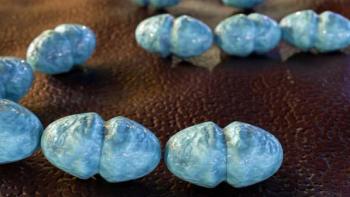
C. Difficile
Latest News

Video Series

Latest Videos
Podcasts
CME Content
More News

IND clearance enables a randomized, double-blind study of IMM-529 with standard care, while a forthcoming USU Travelan field readout will guide dosing strategy.

The foundation has unveiled its 2025 campaign, highlighting the deadly toll and long-term consequences of these infections through nationwide events, education initiatives, and tributes throughout November.

This week review more highlights from IDWeek, and why one researcher is predicting a milder avian influenza season.

Ed J Kuijper, MD, PhD details who is at highest risk for rCDI, how to interpret NAAT–toxin results, and how to sequence fidaxomicin, vancomycin, and microbiota-based therapies.

This week, there are C diff and hepatitis roundup reports, how COVID-19 has disrupted traditional respiratory virus patterns with summer surges now preceding the typical winter influenza season, a review of a trial comparing dalbavancin with standard intravenous therapy for Staphylococcus aureus, and more.

Although the number of people with knowledge about the infection rose, the results demonstrate a continued need for further education and awareness among the public.

A recent publication describes the results of a clinician survey conducted in 2024 regarding preferences and actual practices in the management of C difficile infection in adults.

The financing supports phase 3 evaluation of Sidiprev, a first-in-class, nonantibiotic therapy designed to prevent C difficile infections, a leading US health care–associated threat.

This week, expert insights highlighted progress in reducing C difficile with electronic hand hygiene monitoring, advancing HIV prevention with lenacapavir, updating COVID-19 vaccines for high-risk groups, and more.

C difficile remains a major healthcare-associated infection. Despite clear guidelines, hand hygiene compliance often falls short, creating gaps between policy and practice. A case study from a hospital showed that after implementing an electronic hand hygiene monitoring system with behavior prompts, compliance improved.

Systematic review finds FMT and standardized microbiome products outperform antibiotics in efficacy and safety.

C difficile carriers faced a higher baseline risk for hospital-onset infection compared to noncarriers, and this risk was not significantly influenced by antibiotic use.

This week, predictive microbiome models for C difficile, synergistic antibiotic strategies for E faecalis, to pharmacy-led hepatitis C care, and more.

A new study finds that personalized gut microbiome models may predict C difficile colonization risk and guide targeted probiotic treatment.

The most successful FMT approach involved administering multiple-dose capsules or colonoscopy following an extended course of antibiotic pretreatment.

This week, a mother's struggle with C difficile during pregnancy, racial disparities in COVID-19 treatment, Supreme Court decision preserving access to HIV prevention, and more.

Sara Embry discusses her experience with the infection while pregnant and as a mother to young children as well as finding the Peggy Lillis Foundation to help her cope with the infection and subsequently work as a peer support volunteer for the organization.

The role of oral vancomycin in preventing recurrence of C difficile infection (CDI) in at-risk persons receiving systemic antibiotic for non-CDI infection remains unclear after randomized trial.

This week, Moderna’s mRNA-1010 flu vaccine showed strong phase 3 results, new research reveals that FMT may fail due to functional mismatches between donor microbes and the recipient’s gut, and more.

Findings from a multicenter US study confirm that RBL is a safe and effective microbiota-based therapy with sustained remission in a high-risk population with comorbidities.

Use of an AI-guided infection prevention bundle did not significantly reduce CDI incidence but was associated with increased antimicrobial stewardship.

At ASM Microbe 2025, researchers underscored the role of NAAT in outpatient CDI diagnosis and raised concerns over PPI-related risk in older, health care–associated cases.

A study presented at ASM Microbe 2025 questions the clinical value of adding enzyme immunoassays to PCR-based CDI diagnostics amid sensitivity concerns.

Multiple studies highlight fidaxomicin’s effectiveness across high-risk populations despite cost and access challenges, underscoring the need for education and stewardship to improve guideline adherence.

Environmental contamination plays a larger role than previously recognized, prompting calls for updated infection control strategies.











































































































































